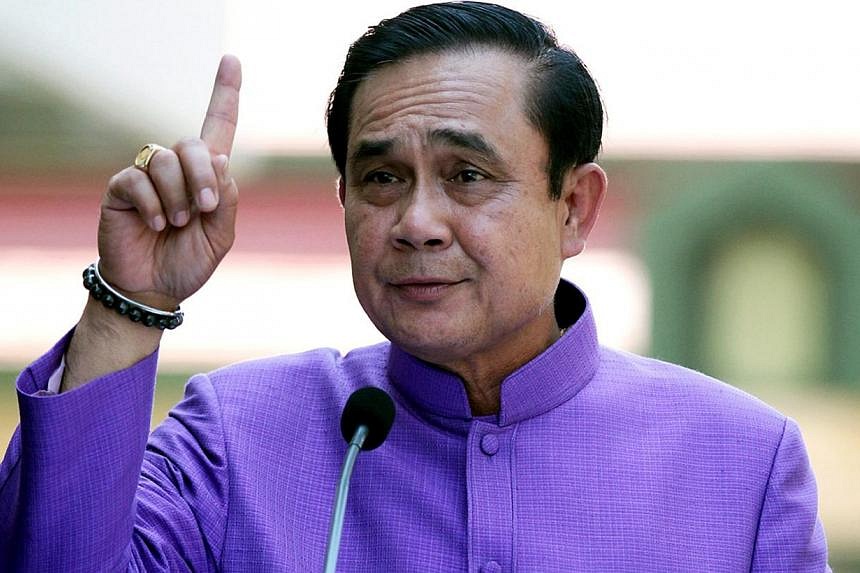BANGKOK (THE NATION/ASIA NEWS NETWORK) - International rights groups aired criticism against the government's imminent use of absolute power under Article 44 of the interim Constitution, with the International Commission of Jurists (ICJ) calling for a return to civilian authority and Human Rights Watch (HRW) urging foreign friends of Thailand not to be "fooled".
HRW warned yesterday that the use of "unaccountable" power under Article 44 by Prime Minister General Prayut Chan-o-cha, in his capacity as leader of the National Council for Peace and Order (NCPO), would mark Thailand's "deepening descent into dictatorship".
"Thailand's friends abroad should not be fooled by this obvious sleight of hand by the junta leader to replace martial law with a constitutional provision that effectively provides unlimited and unaccountable power," warned Mr Brad Adams, Asia director at HRW.
Meanwhile, ICJ secretary-general Wilder Tayler warned on Tuesday that Article 44 was drafted so broadly that "it could give the head of the junta even greater powers than martial law".
"Article 44 would allow the head of the NCPO to issue any orders he wishes under the pretext of strengthening public unity and national security, and also deems any such order to be legal and constitutional, removing any possibility of judicial oversight," he said.
He also claimed that Article 44 violated the fundamental pillars of the rule of law and human rights, in terms of equality, accountability and predictability. He added that the junta should commit itself to observing Thailand's international obligations by avoiding any use of Article 44.
Meanwhile, Mr Adams pointed out that there were no judicial or other oversight mechanisms in place to examine the use of these powers and that General Prayut only needed to report his decisions and actions to the military-appointed National Legislative Assembly and to himself as prime minister.
In a statement, HRW said: "The imposition of (Article 44) means the junta's lifting of martial law is unlikely to lead to improvement of respect for human rights in Thailand… The junta will have legal justification to continue its crackdown on those exercising their fundamental rights and freedoms. Criticism of the government can still be prosecuted, peaceful political activity banned, free speech censored and subject to punishment, and opposition of military rule not permitted."
"General Prayut's action to tighten rather than loosen his grip on power puts the restoration of democratic civilian rule further into the future," Mr Adams said. "Concerted pressure from Thailand's allies is urgently needed to reverse this dangerous course."
The statement also pointed out that since the May 2014 coup, the NCPO had detained hundreds of politicians, activists and journalists among others without allowing them access to lawyers or ensuring other safeguards against mistreatment.
The junta has refused to provide information about detainees, which means that the risk of enforced disappearance, torture and other ill treatment significantly increases when people are held incommunicado, the statement said, adding that there has been no indication of any official inquiry into reports of torture and mistreatment.
"The use of military courts, which lack independence and fail to comply with international standards, to try civilians is likely to continue under (Article) 44," HRW said.
Domestically, criticism against the use of Article 44 continued.
Chiang Mai University academic Attachak Sattayanurak called the threat to use the provision "scary", but added that it would be very difficult truly to exercise absolute power. He pointed out that even during the period of absolute monarchy in Thailand, the sovereign could not truly exercise absolute power.
Though Article 44 will make one person powerful, Mr Attachak predicted that in reality people would oppose the use of absolute power in some areas, such as limiting land ownership.
However, Mr Panitan Wattanayagorn, adviser to Deputy Prime Minister General Prawit Wongsuwan, defended the use of Article 44, saying it was necessary to keep a lid on political protests and violence, though he said it would allow more room for political activity than under martial law.
Mr Panitan expects the situation to improve and urged people in Thailand and abroad not to worry.
Former Democrat MP Wirat Kalayasiri, who also leads the party's legal team, said Mr Prayuth could now make decisions on issues like amnesty by exercising his power under Article 44, but warned against misuse of that power.
"The NCPO must realise it cannot use Article 44 to hide things from the public," he said.

